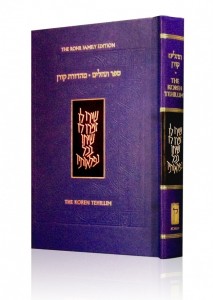 Although usually billed as a very readable English translation of Tehillim (which it is), the unquestionable value of the new Koren Tehillim lies in the commentary written by Rabbi Dr. Tzvi Hersh Weinreb, a musmach of Rabbi Yaakov Yosef Yeshiva in New York, and Executive Vice President Emeritus of the OU, with translation by Rabbi Eli Cashdan (zt’l) of London.
Although usually billed as a very readable English translation of Tehillim (which it is), the unquestionable value of the new Koren Tehillim lies in the commentary written by Rabbi Dr. Tzvi Hersh Weinreb, a musmach of Rabbi Yaakov Yosef Yeshiva in New York, and Executive Vice President Emeritus of the OU, with translation by Rabbi Eli Cashdan (zt’l) of London.
The commentary provides a refreshing approach. It is not the usual verse by verse or phrase by phrase explanation of text. Rather, it is a conceptual, almost associative approach looking at each tehila (singular of tehillim) as a unit with a message. Needless to say, that message is always applicable to our lives today. If there is a one sentence summary of this sefer, Tehillim shows us that no matter if a situation is desperate, ominous, or joyful, we must always gain strength from faith in the Almighty.
The associative approach is novel in modern commentaries, but it is well known from the Gemara. Sometimes a word or phrase in the psalm evinces a thought seemingly not directly related. After all, isn’t that the purpose of tehillim? To apply verses to our own lives and refine our faith and behavior.
The commentary and meditative introductions show an impressive mastery of sources from Gemara both earlier and modern rabbinic scholars. Regarding the latter he is equally conversant with Rabbi Shimshon Raphael Hirsch on the one hand and chasidic masters on the other.
One example is Psalm 7. Rabbi Weinreb, also a professionally trained psychologist, explains that the love/hate relationship of David and Saul was not simple. Regarding Amalek we fought against them without restraint. In modern times we fought against the Nazis without the least bit of pity or reservation.
The situation of David was clearly different. Saul had been a king. David was certain of his own victory because he was Divinely appointed. Yet, despite unswerving confidence in his ultimate victory, David could not fight his challenger without mercy. After all, Saul was his predecessor.
Avshalom rebelled against David, yet the latter again showed compassion. After all was said and done, Avshalom was still David’s son.
According to Rabbi Weinreb this particular chapter in Sefer Tehillim is meant to show the role of compassion. He lesson must be applied to our daily lives. We cannot hate those who have been close to us.
Rabbi Weinreb explains that Psalm 23 is an expression of trust in Hashem and hope. He brings the example of Rabbi Israel Friedman of Ruzhyn (1796-1850) who was slandered, falsely accused of treason, and cast into a czarist dungeon as punishment. Russian torture brought all too vivid reality to the words, “…in the shadow of death.” Yet, he was comforted by knowing that he was not alone, “The L-rd is my shepherd…”
One of the survivors of Treblinka relates that at one point Nazi soldiers hung the paroches of an aron kodesh on the entrance to the camp, and upon it was written, “This is the L-rd’s gate; the righteous shall enter through it.” The intent was to torment the Jews, but one survivor explained that the message actually brought him solace. It was a reminder that Hashem was with him no matter what happens, “The L-rd is my shepherd…”
Clearly, the Koren Tehillim is not just another routine Biblical commentary. It is a volume that is made to evoke thoughts and ponder the messages of the Book of Psalms. For this reviewer the volume does that very successfully, and there is every reason that it will do that for others as well. This edition of Tehillim is recommended without reservation.
The words of this author reflect his/her own opinions and do not necessarily represent the official position of the Orthodox Union.